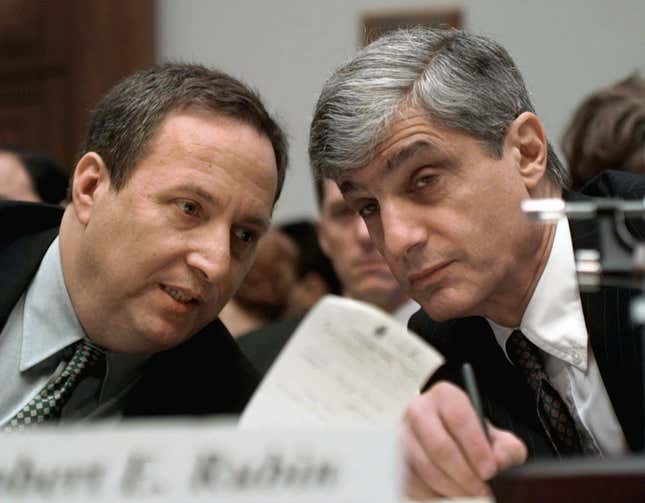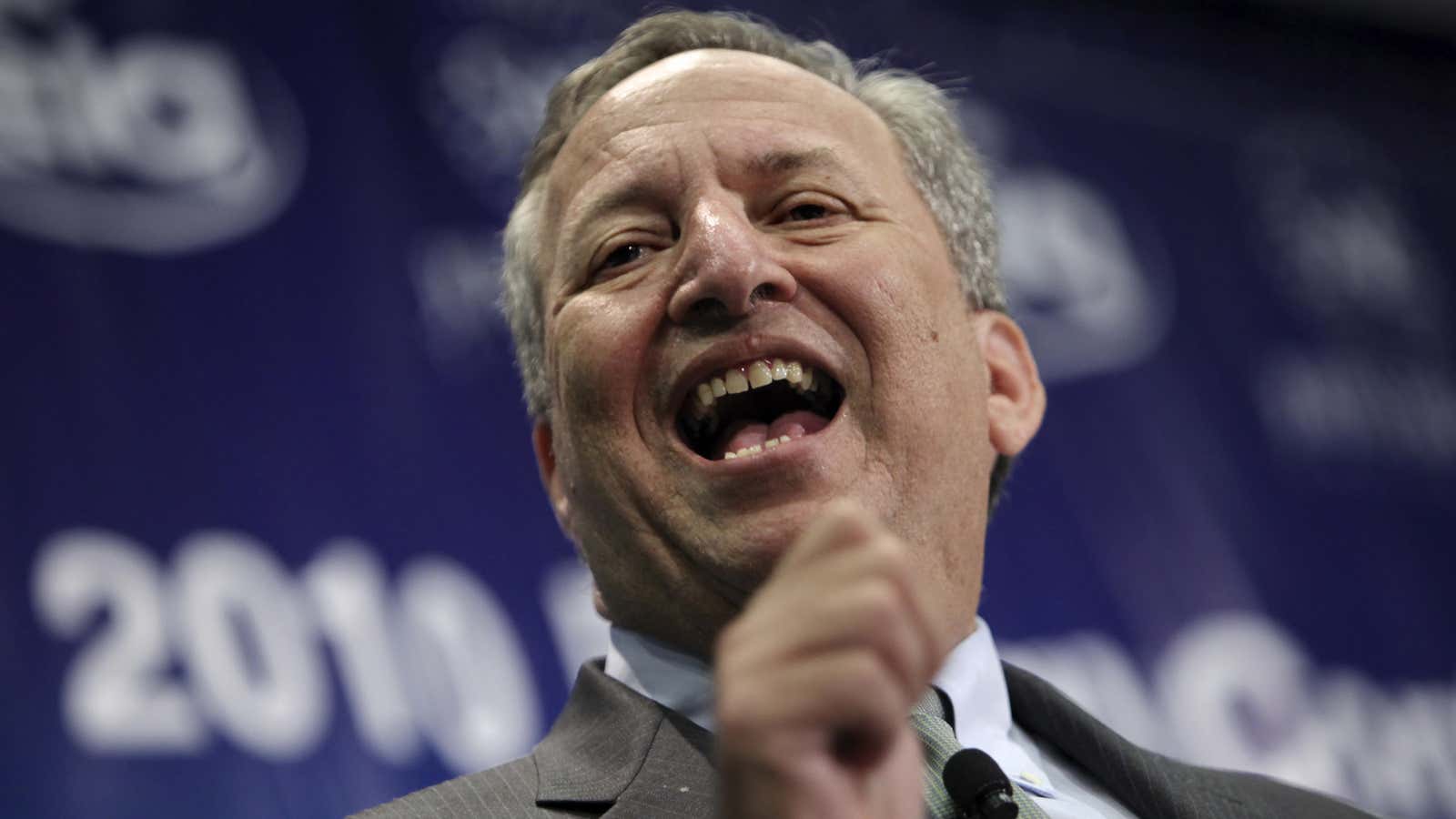Lawrence Summers, the brilliant and famously irascible economist and former US Treasury secretary, still appears to be very much in the running for the next chairmanship of the Federal Reserve.
You likely know the back story. Summers is an intellectual force of nature, almost bred to be an influential economist. Both of his parents were economists. Two of his uncles—Paul Samuelson and Kenneth Arrow—were Nobel laureates in the discipline. He did his undergraduate work at the Massachusetts Institute of Technology and his doctorate at Harvard, where he became a tenured professor in his late 20s, one of the youngest ever. He spent two years as chief economist at the World Bank, joined the Clinton administration in 1993, and succeeded Robert Rubin as Treasury secretary in 1999. He had a tumultuous stint (paywall) as president of Harvard University, followed by a remunerative tour in Hedgefundistan (paywall). Then it was back to Washington as director of Obama’s National Economic Council until the end of 2010.
And then there’s the downside. The so-called “toxic memo” at the World Bank, an internal document in which he argued, provocatively, the economic merits of rich countries shipping their toxic dreck to poor countries, calling the logic “impeccable.” His musings while president of Harvard that “innate” differences between men and women could help explain why few women reach the upper echelon of the sciences. In accounts of his time in the Obama White House, Summers emerges as an unmanageable, control freak. Obama fix-it man Pete Rouse’s famous memos on White House operations note “there is deep dissatisfaction within the economic team with what is perceived as Larry’s imperious and heavy-handed direction of the economic policy process,” according to Ron Suskind’s inside look at the early days of the Obama administration.
Suskind also reports that while at the White House Summers appeared to believe he was next in line for the chairmanship of the Fed and was apparently furious when then-Treasury secretary Tim Geithner counseled Obama to reappoint Ben Bernanke. Now Summers is showing up in short lists of possible successors to Bernanke. (We reached out to him for comment on Friday, and will update with any response.)
Summers’ personality generates more passionate feelings than your typical technocrat. It’s not this reputation, however, which leads us to think he’s not the right fit for the Fed’s top job. It’s his record on some of the most important economic questions that have come along during his career. Here’s a look.
1. He was a big part of the Clinton-era deregulatory push that led up to the financial crisis

As President Bill Clinton’s Treasury secretary, Summers negotiated key details and the passage of the Gramm-Leach-Bliley Act in 1999. That was the law that effectively did away with the Depression-era protections that separated commercial banks—more tightly regulated entities with access to Federal Reserve funding and FDIC consumer deposit protections—from Wall Street trading houses that engaged in riskier activities like bond trading and underwriting corporate debt. It was widely seen as the culmination of a 30-year deregulatory push in Washington. “At the end of the 20th century, we will at last be replacing an archaic set of restrictions with a legislative foundation for a 21st-century financial system,” Summers told the New York Times, when the Clinton administration struck a deal on the law.
Instead, the passage of the act the end of the 20th century set the stage for the first financial panic of the 21st century, which peaked in 2008 with the collapse of Lehman Brothers. True, Lehman was a standalone investment bank that had not merged with an plain vanilla banking entity. But Lehman’s fall really only marked the start of the worst phase of the crisis. The US government and tax payers were forced to put billions into entities such as Bank of America, Citigroup and AIG—among others—where the risk-taking, trading culture of Wall Street—long quarantined by Depression-era regulations—had infected institutions and brought them to the brink of a collapse that would have had disastrous impacts on the economy.
Current CFTC Chairman Gary Gensler, who served in Summers’ Treasury, has acknowledged publicly that the deregulatory impulse might have been over active during the Clinton administration. Deputy Secretary of the Treasury Neal Wolin—who also served under Summers—admits that to some extent the Clinton era was “‘intoxicated by the success of the markets’ and went too far.” Even the big dog himself, Bill Clinton, has performed a mea culpa for his administration’s deregulation of the derivatives business, which caused plenty of problems that emerged in the crisis. He blamed bad advice he got from Summers and former Treasury Secretary Robert Rubin, saying “‘I think they were wrong and I think I was wrong to take” their advice.
If Summers has made similar acknowledgements, they’re awfully hard to find. As recently as early 2012, Summers told an interviewer: [Time: 11:20] “What I didn’t favor was the continuation of so-called Glass-Steagall in the United States, rules that … kept banks and investment banks separate… And I think the evidence is that I’m right about that. If you look at the big failures, Lehman and Bear Stearns were both standalone investment banks. Perhaps if they had been combined with banks they would have been in a more healthy situation.”
2. He was especially wrong about derivatives
In the late 1990s when the then-head of the Commodities Futures Trading Commission, a woman by the name of Brooksley Born, wanted to publicly explore regulating the bets between financial market participants known as derivatives. Summers—along with Washington’s other top financial power brokers of the era, Rubin and Fed Chairman Alan Greenspan—pushed hard against such a move. The Washington Post reported:
Summers, then the deputy Treasury secretary, mounted a campaign against it, CFTC officials recalled.
“Larry Summers expressed himself several times, very strongly, that this was something we should back down from,” [top aide to Born, Daniel] Waldman recalled.
In one call, Summers said, “I have 13 bankers in my office and they say if you go forward with this you will cause the worst financial crisis since World War II,” recounted [Michael] Greenberger, a University of Maryland law school professor who was Born’s director of the Division of Trading and Markets. Summers declined to comment for this article.
For more on the battle over derivatives regulation, check out this excellent Frontline on the topic. Or read Summers’ testimony on the subject from back in 1998.
Of course, derivatives became a huge issue during the financial crisis, famously almost destroying insurance giant AIG, which had to be propped up with what turned out to be one of the largest—$182 billion in taxpayer money, which has since been recovered—rescue of the entire debacle. But even that hasn’t settled the issue of derivatives regulation. Five years after the crisis, it’s still a political football. A Fed chairman invested in derivatives regulation would help cement rules into place.
In a 2009 op-ed co-written with then-Treasury Secretary Tim Geithner, Summers endorsed “strong oversight” of so-called over-the-counter (OTC) derivatives. But Summers’ statements on derivatives have been less than full-throated.
3. He was hostile to warnings about the financial crisis
The most famous example of this was the August 2005 Federal conference in Jackson Hole, Wyoming. The conference had pretty much devolved into an extended praise poem for then-departing Fed chairman Greenspan. University of Chicago economist Raghuram Rajan had to go and spoil things by delivering a paper that warned about dangerous risks to the financial system that ballooned under Greenspan’s watch.
The conference turned contentious, as Summers publicly smacked down the analysis saying he found the “slightly Luddite premise of this paper largely misguided.” Of course, Rajan’s paper proved one of the more public, prescient warnings of the looming financial crisis that was ever delivered. After the experience of the last decade, it would probably best to have someone in the top job at the Fed who would give such warnings a bit more thought.
The bottom line
Some, such as the Financial Times’ Edward Luce, have made the argument that Summers’ thick skin makes him ideal to lead the Fed through its next phase, which—hopefully—will involve weaning financial markets off the extraordinarily easy money policy the Fed was forced to put in place because of the financial crisis. “The most important quality is intellectual leadership–something Mr Summers would offer in greater abundance than the others,” Luce writes.
We’d respectfully suggest that the lesson of Greenspan’s tenure—when the central bank became something of a personality cult—is that it is a dangerous thing for the Fed to be a one-man show, dominated by a single, dazzling intellect. That’s even more true when the intellect in question has been wrong on key questions related to one of the Fed’s key roles: Regulating Wall Street.
